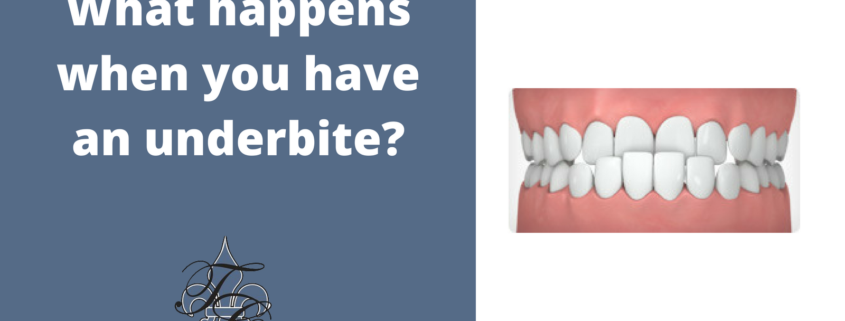What happens when you have an underbite?
No matter how well you take care of your teeth, there are certain dental problems that are caused by genetics and there’s nothing you can do to prevent them. An underbite is one of those issues.
However, just because you can’t prevent an underbite does not mean that you need to live with it for the rest of your life or let your lifestyle suffer as a result.
What is an underbite?
An underbite occurs when a person’s lower jaw extends farther out than the upper jaw, creating an overly pronounced and protruding lower jaw. The level of misalignment ranges from barely noticeable to severe.
Even though an underbite is usually caused by genetics, other natural causes include:
- poor eating and chewing habits
- mouth breathing as a result of constant congestion or habit
- thumb sucking
- an abnormal jaw bone
In many of the cases above, it can be the individual’s tongue resting against the lower jaw and lower front teeth that causes the jaw to move forward over time.
What happens when you have an underbite?
- Appearance: Because underbites are so much less common than overbites, people who have them tend to be noticed more and become self-conscious as a result. A protruding chin adds to this and can lead to people with underbites being ridiculed as children.
- Articulation Errors. Clear speech is a common problem. Any sound that depends on the teeth could be problematic, such as “s” and “f.”
- Tough to Smile. A bad underbite could make it impossible to smile with confidence. Lips tend to take on a droopy appearance, and a dominant upper lip hides the upper teeth when smiling. With a more severe underbite it becomes difficult to keep the lips together, causing lip incompetence, changes in your facial profile, breathing and swallowing problems.
- Chewing Problems. Due to misaligned teeth it could become very difficult to chew your food. One of our patients with a severe underbite problem reported gagging and ended up in the emergency room. Further side effect of chewing with misaligned teeth are excessive enamel wear, tooth chipping, tooth decay, infections and gum disease.
- Chronic Jaw Pain. As the upper teeth push in under the lower teeth, the pressure on the jaw joint intensifies, which could trigger a TMJ disorder. This in turn could lead to headaches, neck pain, spinal misalignment, and even limping.
As you can see, underbites impact everything from daily activities like chewing and smiling to longer-term physical and mental health. Luckily, there are several treatment options available to bring the upper and lower jaw into alignment.
How do you correct an underbite?
- Upper jaw expander: A device called a Palatal Expander is placed on the roof of the mouth and widened each night as treatment progresses. Over time, this increases the size of the dental arch and brings the upper and lower jaws into alignment.
- Reverse Pull Face Mask: This resembles the headgear you may have seen on people with braces. It wraps around the head and attaches to metal bands on the back of the upper teeth to pull the upper jaw forward so it’s in line with the lower jaw.
- Chin Cap: This device wraps around the chin and lower jaw to prevent it from growing and expanding out even further. This is a good option for children or teens whose jaws are still being formed.
- Braces and veneers: Traditional braces may be used to correct mild underbites. Veneers may also be placed on the upper teeth so that top and bottom teeth align. Again, this is only recommended for non-severe underbites.
If none of those options are feasible, an oral and maxillofacial surgeon can perform underbite correction surgery to manually bring your upper and lower jaws into alignment. Braces are typically required after surgery to keep the teeth in alignment while your mouth adjusts to its new configuration. Children are more likely candidates for non-surgical intervention because their jaws are still developing. Once the jaw becomes fully formed in adulthood, it becomes more difficult to correct bite issues.
Let Chauvin Dental Help
If you have an underbite, no matter how severe, our team at Chauvin Dental in Lafayette, Louisiana, can help develop a treatment plan that will improve your quality of life and lead to a healthier mouth in the long run.


